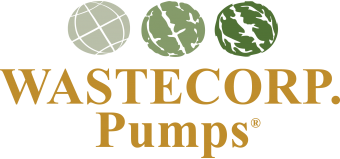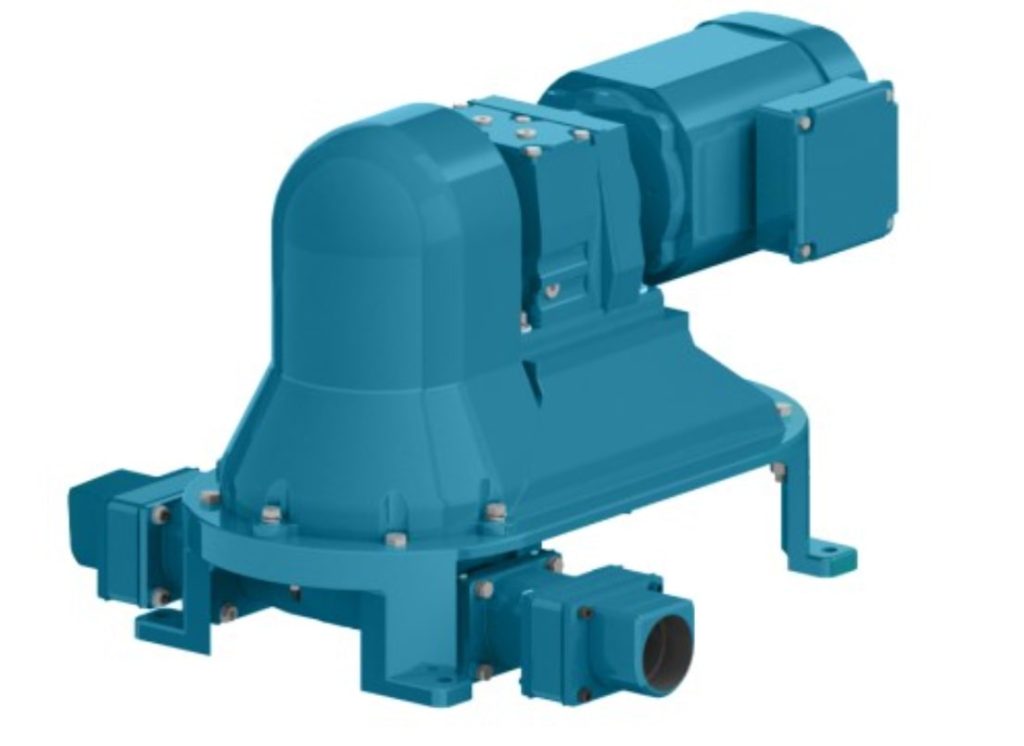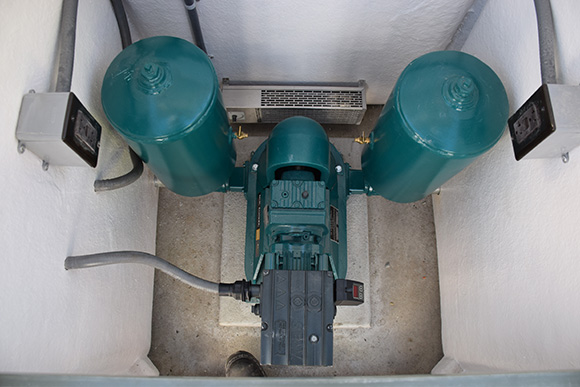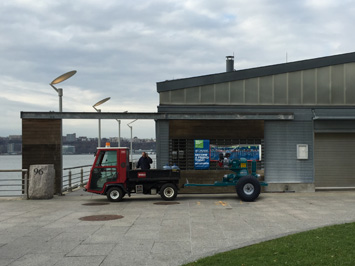Modern food production demands safety and efficiency in all of its processes. During every step of production, preventing contamination and waste is crucial to delivering a product that maintains consumer trust while using resources effectively. If these conditions are not met, the whole supply chain, including food producers, suppliers, and the clients that depend on them, can experience significant disruption and loss of revenue.
One of the most important tools in the fight against food and beverage contamination is the diaphragm pump, a positive displacement pump. By design, well-maintained diaphragm pumps are enclosed, leak-free units. In a diaphragm pump, there are simple gaskets between the wetted parts so the fluid can’t escape from the pump chambers, and outside air doesn’t get in. This design, in combination with the durable materials used for high-quality diaphragm pumps, ensures these pumps can maintain a seal even under high-temperature and high-pressure conditions without requiring lubrication or maintenance. (To learn more about how diaphragm pumps work, check out our Comprehensive Guide to Diaphragm Pumps.)
These qualities make diaphragm pumps highly versatile in the food industry. Today, you can find diaphragm pumps in almost all areas of food and beverage processing, including the production of dairy products, sauces and condiments, juices, fruit slurries, beer and wine, syrups, pie fillings, flavorings, and more. Diaphragm pumps are also used to remove food waste after processing and, in some cases, convert it into biofuel, reducing landfill use.
Table of Contents
How Diaphragm Pumps Ensure Hygiene and Sanitary Compliance
Beyond their sealed design, diaphragm pumps offer multiple advantages that help ensure food and beverage products remain sanitary. At Wastecorp, we manufacture a range of food and beverage processing pumps that meet the stringent sanitation standards established by the FDA and CFIA. To ensure compliance, select Wastecorp Mud Sucker brand diaphragm pumps (Wastecorp food processing pumps) are constructed with FDA-compliant materials cleared for contact with food and beverages, such as Santoprene, Polytetrafluoroethylene, Teflon (PTFE). These materials are ideal for food and beverage processing because they’re extremely smooth, which makes them easy to clean and sanitize. They also pose a reduced risk of contamination and will not chemically react with food and beverage products. Before Wastecorp specifies any of our pumps for food/beverage processing we conduct a thorough engineering review to ensure that we are in compliance with the necessary standards
As part of our diaphragm pump customization service, Wastecorp allows food manufacturers to choose from various food-grade materials to ensure the best material is used for the product being pumped. Additionally, our diaphragm pumps resist corrosive and abrasive materials and can transfer liquids with large suspended solids, giving them unmatched longevity and versatility.
Some other advantages of Wastecorp food and beverage processing pumps are as follows:
– A smooth, crevice-free design that minimizes the potential for bacteria growth inside the pump and facilitates easy cleanup.
– Improved flow and clog resistance thanks to our exclusive contoured velocity channel technology. Several WasteCorp food processing pumps, such as the 3″ Electric Pro Flapper Diaphragm Pump, contain our contoured velocity channel (unique in the pumping industry), designed to enhance the flow of slurries and liquids with a high percentage of suspended solids.
– Numerous safety features, such as pressure relief systems, explosion-proof motors, and safety guards to protect operators from moving parts and ensure the safe operation of the pumps
– Superior energy efficiency for reduced operating costs.
4 Benefits of Using Diaphragm Pumps for Food & Beverage Applications
While diaphragm pumps are integral to many industries, they’re particularly important equipment for the food and beverage sector. Some of the advantages of using diaphragm pumps for food and beverage production processes are as follows:
1. Improved product integrity and quality.
Diaphragm pumps are ideal for use with shear-sensitive liquids (i.e., liquids prone to separation). The gentle reciprocating action of diaphragm pumps prevents the excessive agitation of food and beverage products, preserving their texture, flavor, and nutritional properties. For example, in the dairy industry, diaphragm pumps transfer milk, cream, yogurt, and other dairy products without allowing air penetration or changing their viscosity, which is crucial to meeting consumer and industry standards. Some diaphragm pump models may optimize yield during cheesemaking by limiting the production of fines (small particles in the whey that pass through cheese molds, resulting in product waste).
2. Enhanced process efficiency and productivity.
Because they offer precise dosing and flow rate control, certain diaphragm pump models allow for accurate and consistent product transfer. Some diaphragm pump models can fill bottles, cans, and other food and beverage containers with specific quantities of liquid, greatly minimizing waste and delivering reliable product quantities to the consumer. Likewise, because diaphragm pumps can process liquids with a wide range of viscosities, a single pump can often be used for multiple applications, which reduces service interruptions.
3. Ease of cleaning and maintenance.
Diaphragm pumps have a reputation as easy to clean and maintain as compared to other types of pumps. They have relatively few moving pump components and are highly resistant to clogging; as such, high-quality diaphragm pumps rarely break down.
4. Reduced product loss and waste.
By preserving the integrity of shear-sensitive liquids and allowing for precise dosing, certain diaphragm pump models significantly reduce waste in the food and beverage industry. Not only does this improve environmental sustainability by using resources more effectively, but it also supports profitable operations.
Considerations for Diaphragm Pump Selection
To select the right diaphragm pump for your food or beverage application, you’ll need to consider several criteria:
What is the required flow rate and pressure for your specific task?
Make sure the pump is capable of transferring the correct volume of product at the pressures required for your application. As a general rule, we recommend choosing a pump one porting size up from what you need; doing so will allow you to run the pump at reduced speeds, greatly extending its service life.
Is the pump compatible with the food product you wish to transfer?
Some food and beverage products (such as vinegar) are corrosive and therefore capable of damaging certain diaphragm pump materials. To prevent this from occurring, use the Wastecorp chemical compatibility guide to determine which materials are most compatible with the substance you intend to pump.
Does the pump have the correct certifications?
Make sure the pump meets all regulatory requirements in your USA or Canada jurisdiction and for your sector of the food and beverage industry. For example, in 2019, the Safe Food for Canadians Act introduced more stringent regulations for the food and beverage industry, requiring that companies use only high-quality, food-grade pumps.
How easy will it be to maintain the pump?
Though diaphragm pumps are generally low maintenance, they do require periodic upkeep. You will, for instance, need to replace the pump’s diaphragms after every 300 hours of use. To reduce the risk of service interruptions, purchase your pump from a manufacturer that supplies matching diaphragm pump parts.
For more information on how to choose the best diaphragm pump to meet your needs, consult our in-depth guide to Selecting the Right Diaphragm Pump.
Conclusion
Modern food processing methods allow for the safe, efficient delivery of food to billions of people, all while reducing food waste, landfill use, and energy consumption. Without diaphragm pumps, preventing contamination and food-borne illness would be significantly more challenging, as would waste management.
If you’re looking for a diaphragm pump that ensures your production process meets FDA and CFIA standards while delivering an exceptional service life and optimum energy efficiency, Wastecorp may be able to help. We offer a wide range of pumps, including single or double-diaphragm pumps, with various power sources, such as electric, hydraulic, air-operated, gas, and diesel. See our full range of pumps here.
Contact our team of experts today to learn more about our range of food and beverage processing pump options and our many customization options.



